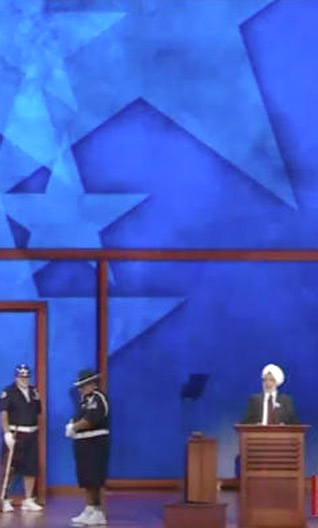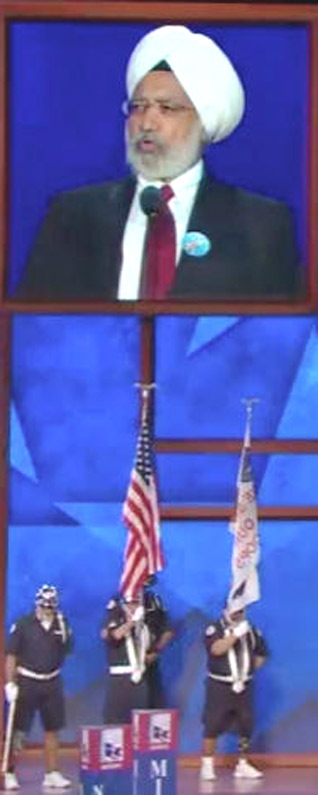Current Events
The Invocation at the Convention:
Another Perspective
VALARIE KAUR
The Republican National Convention made history Wednesday night (August 29, 2012). S. Ishwar Singh, wearing a turban and beard, took the stage and led thousands of conservatives in prayer.
For the first time in U.S. history, a Sikh-American gave the invocation at a Republican National Convention.
The inclusion of a Sikh prayer on the stage came just a few weeks after a gunman opened fire on Sikhs praying in Oak Creek, Wisconsin, killing six and hospitalizing three more in what could be the largest racially motivated mass shooting in recent U.S. history.
Many praise the invocation as a mark of progress in the Sikh community's 100 years in America.
Visuals matter.
And in a racially charged political climate, a turbaned and bearded man will be presented to the country by Republicans as a fellow American.
This is a remarkable step forward.
But speech also matters.
If Mitt Romney and Republican leaders want the historic Sikh invocation to be more than tokenism -- and are serious about preventing another Oak Creek -- they cannot continue to let hateful speech within their own party go unchecked. In a time when hate groups are on the rise, the Republican Party must accept responsibility for fostering a political climate that often casts people of color as foreign and inherently suspect.
GOP leaders have not only stood silent while fellow Republicans fan the flames of anti-immigrant and anti-Muslim bias, they have given them the megaphone. Ishwar Singh spoke on the same stage as Sheriff Joe Arpaio, infamous for shaming and rounding up undocumented immigrants, saying that it's an honor to be compared to the KKK. Newt Gingrich, who is presiding over "Newt University" at the RNC, has compared Muslims to Nazis.
Kansas Secretary of State Kris Kobach, also speaking at the convention, helped write a platform plank that includes supporting a ban on foreign law, which he admits targets the religious principles of Muslim Americans. The plank, which copies anti-Sharia bills pushed by extreme conservative groups, is roundly condemned as a smoke-screen for anti-Muslim bigotry.
Romney has not spoken out against it.
Similarly, when U.S. Rep. Michele Bachmann, R-Minnesota, and four other members of Congress recently demanded the government investigate American Muslim government employees and organizations for "infiltrating" and sabotaging the government, Romney and prominent Republican leaders remained silent.
What's worse, Romney, who could be our president, has played into the xenophobia himself, making statements that imply President Barack Obama's skin color renders him foreign or suspect.
On Friday at a campaign stop, Romney said, "No one has ever asked to see my birth certificate. They know that this is the place that we were born and raised." At a campaign stop in Pennsylvania, he said that Obama was trying to "change the nature of America" and that "his course is extraordinarily foreign."
In 2001, in the aftermath of the terrorist attacks, hate crimes against Muslims and those perceived to be Muslim shot up by 1,600%. To President George W. Bush's credit, he publicly repeated that Muslims were not our enemies. While prejudice and profiling became part of life for Muslims and Sikhs, violent hate crimes fell by two-thirds in 2002 and stayed low -- until two years ago.
In 2010, anti-Muslim hate crimes jumped 50%. Nothing new happened to explain the increase, except this: fringe conservative groups pumped $42.6 million into think tanks to promote anti-Islam ideologies and successfully manufactured a controversy around Park 51, the so-called "ground zero mosque." At the same time, politicians such as Bachmann, U.S. Rep. Peter King of New York and Newt Gingrich pushed anti-Muslim agendas by supporting anti-Sharia legislation.
Words matter.
Public voices have a responsibility for generating a climate of xenophobia, fear and hate. The Oak Creek gunman was a product of white supremacist hate groups, which have been on the rise in recent years. Online hate groups have increased by 30% in the past year alone. For those like the Wisconsin gunman, it seems to matter little whether their targets are Muslim or Sikh -- they harbor hate for anyone who does not look like them.
To be sure, we should give the Republican Party some credit.
In a time when many Sikhs have expressed disappointment that Obama has not yet come to visit the victims in Oak Creek, most are grateful for the opportunity for a Sikh prayer to be delivered on a national platform. But if that same party permits its politicians to spew hateful speech unchecked, then the gesture simply masks deeper trouble at the core of the Republican Party.
It wasn't always this way.
My Sikh-American father was a Republican, proud to belong to the party of Abraham Lincoln and Ronald Reagan. He raised my brother and me with lectures on the value of hard work, small government and independence. My own progressive politics in college made for colorful arguments at the Thanksgiving table.
It wasn't until the decade after 9/11 -- after witnessing firsthand how his party caved to fear-mongering, racial profiling and expansive federal power -- that he joined me in campaigning for candidate Obama. My father is one of millions of brown and black Americans alienated by a Republican Party that has forgotten its own values.
Hearing that a Sikh will pray on the stage of the Republican National Convention warmed my father's heart. But it didn't make him forget. If the Republican Party wants to appeal to people like my father again, it must remember its own soul.
Romney and Republican leaders must check extremism in speech. They can start by meditating on the Sikh prayer to be offered by Ishwar Singh: "Nanak naam chardi kala, tere bhaane sarbat da bhallaa."
Calling upon God in the spirit of eternal optimism, the prayer asks for blessings not upon one party, community or even one country, but for sarbat da bhallaa -- all of humanity.
Valarie Kaur is the founding director of Groundswell, an initiative at Auburn Seminary that combines storytelling and advocacy to mobilize faith communities in social action. Her documentary "Divided We Fall" examines hate crimes against Sikh-Americans after 9/11. She studied Religion and Law at Stanford University, Harvard Divinity School and Yale Law School, where she now directs the Yale Visual Law Project.
[Courtesy: CNN. Edited for sikhchic.com]
August 30, 2012
Conversation about this article
1: Sunny Grewal (Abbotsford, British Columbia, Canada), August 30, 2012, 11:56 AM.
The Republican party and its supporters need to admit the fact that their party is responsible for cultivating a culture of hatred where minority groups are seen as the enemy or scapegoats. These are the same people who call groups such as the NAACP racist and justify white supremacist groups as being no different than groups such as La Raza or the Black Panthers. At the convention there was an incident where two Republicans threw nuts at a CNN staff member and said "This is how we feed animals". Although these two were promptly removed, one has to ask if such an incident would have happened at a Democrat convention.
2: Akal Singh (Portland, Oregon, USA), August 30, 2012, 1:45 PM.
Thank you for mentioning Park 51, and regarding George Bush's comments that Muslims are not our enemies. You have pointed out the hypocrisy of the Republican-funded "think-tanks" that find ever more creative ways to demonize Muslims; all part of a sophisticated war propaganda campaign to re-shape the world.




